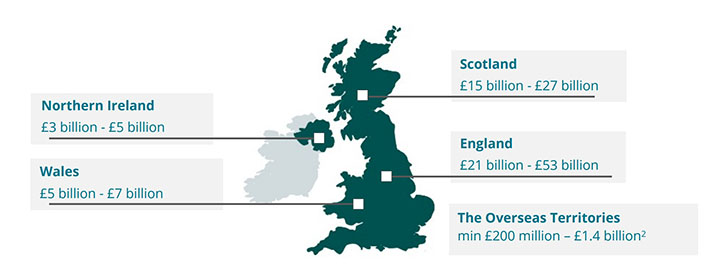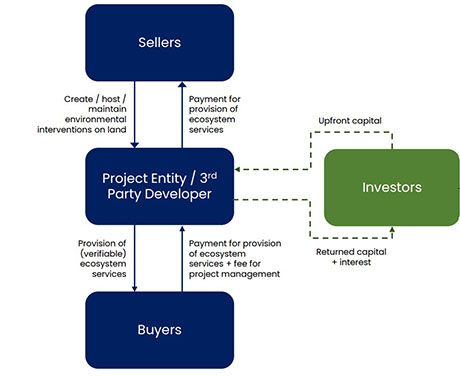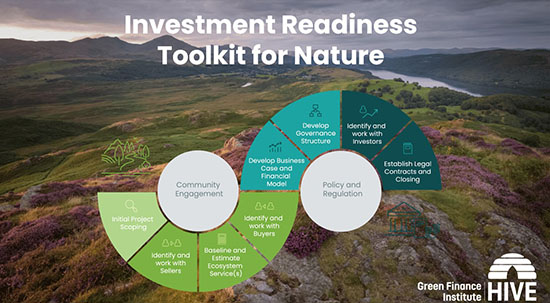Navigating private finance for nature-based projects
This post is greater than 6 months old - links may be broken or out of date. Proceed with caution!

By Phoebe Tucker, Nature Associate

To those who work in biodiversity and nature, it is clear that nature and climate are inextricably linked. We will never meet net zero without being nature-positive – and by restoring and protecting nature, we have so much to gain.
The Green Finance Institute was established in 2019 to identify and unlock barriers to investment towards impactful, real-economy outcomes that benefit our environment, society, and business. Part of what we do is focused on increasing private investment in nature restoration, nature-based solutions and nature-positive outcomes in and for the UK.
We led research in 2021, finding that the UK needs an additional £44 - £97 billion of investment, with a central estimate of £56 billion, over current public spending commitments to deliver our nature-related ambitions up to 2032. It’s clear that the private sector must play a role to meet this gap.
To fill this ‘nature finance’ gap, there are three ‘mission critical factors’:
- develop a supply of investable high-integrity nature projects.
- ensure that that supply is met with demand from investors, financial institutions and corporate buyers, and
- create a supportive market environment and infrastructure, such as incentive-aligned policies, regulatory frameworks, standardised legal agreements, codes and standards.
When we talk about a supply of projects, we mean the way land is used to deliver nature-positive outcomes. This could be the creation of a riparian woodland that provides both carbon sequestration and natural flood management; a species-rich meadow that boosts local biodiversity; or a new wetland that filters excess nutrients from waterways. Those with influence over land use are exploring how we can boost the provision of such ecosystem services and, crucially, the possibilities of using private finance to deliver them.
Private financiers can play two key roles, as buyers and as investors. All nature-based projects and enterprises that aim to use private finance will need at least one revenue stream and a buyer of their ecosystem services; whether that is a corporate buying carbon offsets, a housing developer buying nutrient offsets, or a local council buying reduced flood risk. This revenue can sometimes be delivered early enough to cover the often high up-front costs of the project so that, together with grant funding, the need for a loan or investment is eliminated. In many cases however, a separate upfront investment will be needed, such as a loan or an equity stake, that can be paid back from the sale of the ecosystem service, plus an additional financial return.
Below is an example of a project structure that may be more widely used as ‘nature finance’ is deployed at scale:

Projects that are ready to accept private finance have reached a stage that the GFI calls ‘Investment Readiness’. At this stage, the project will be able to demonstrate that it is:
Profitable – all proposed financial obligations, including returns on investment, can be met
Delivering environmental outcomes – ensured by scientifically-credible baselining, verifiable measures of success, maintenance and monitoring plans
Secure – any risks that threaten the project are mitigated or managed
We need nature-based projects and enterprises to be designed with these requirements in mind - demonstrating revenue generation to pay back investors, and the potential for models to be scaled and replicated. This may be entirely new ground for the many land managers and eNGOs that are naturally placed to develop such projects, and that are used to the traditional model of grant funding.
To help guide project development and accelerate the supply of nature-based projects, the GFI has developed an Investment Readiness Toolkit for nature. The Toolkit is an online and interactive framework that takes nature-based project developers along the eight milestones of a path to Investment Readiness. It provides key considerations, resources and case studies with each milestone.
This framework is intended for any project developer or enterprise interested in restoring or creating natural habitats in the UK with the use of private finance – including farmers, estate owners, charities, local authorities, catchment partnerships and other aggregators. Its content is applicable across a range of environmental outcomes, such as the delivery of woodland creation, peatland restoration, nutrient reduction, natural flood management and biodiversity uplift.
This starts from initial project scoping and concludes with signing legal contracts with key stakeholders including investors or lenders. The framework also includes two ‘horizontals’ that project developers and enterprises should consider throughout this journey – Community Engagement, and Policy and Regulation.
The milestones to develop a project to investment readiness include:

1- Initial project scoping: To determine whether a project can use private finance, there are several early activities required. For example, understanding the site and the land-use changes needed and an initial assessment of the revenue streams that can be generated.
2- Identify and work with sellers: To achieve scale and impact, a project will likely involve multiple sellers, such as neighboring landholders. Project developers must plan how they initially contact and engage with these sellers going forward.
3- Baseline and estimate ecosystem service(s): After creating a vision for the project and selecting ecosystem service(s) to be sold, one can baseline the ecosystem service and quantify what can be delivered, assessing how maintain the site across the project’s lifetime.
4- Identify and work with buyers: You will have identified one or more groups of beneficiaries who may be willing to ‘buy’ or pay for the ecosystem service(s). At this step, you will need to engage buyers directly and work together to agree the terms of sale.
5- Develop business case and financial model: At this juncture, you will need to consider your financial model and business case more fully. Your fuller financial model will also enable you to better understand the potential need for investment and the returns you can offer.
6- Develop governance structure: A governance structure will inform the way in which the project is run when fully operational and for what purpose. For example, it identifies appropriate decision making processes and what controls minimize risks.
7- Identify and work with investors: Some projects will need up-front investment. To develop an investment model, you will need to define the investment ask, develop a strategy for approaching the right investors, negotiate terms, and secure a non-binding offer.
8- Establish legal contracts and closing: When all relevant stakeholders have been engaged and their terms of engagement are clarified as much as possible, this is the time to develop the legal contracts and close the deal.
Looking forward, the GFI will continue to iterate the Toolkit as a free resource that represents the latest thinking in this space, including with case studies from the Natural Environment Investment Readiness Fund.
The GFI is also interested in working with others to create more bespoke versions of the Toolkit. Most recently, the Green Finance Strategy 2.0 announced that the government has commissioned the GFI to develop a toolkit to help farmers identify and navigate opportunities to access private sector investment to pay for nature positive outcomes.
If you are interested in learning more about the Investment Readiness Toolkit and the GFI’s work, please contact hive@gfi.green.
More from Green Finance Institute